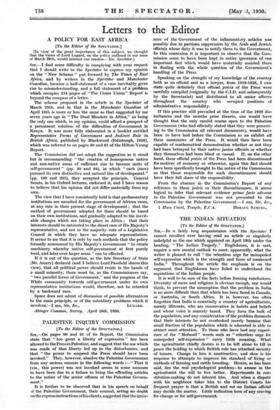PALESTINE INQUIRY COMMISSION
[To the Editor of the SpacTAroa.] SIR,—On pages 90 and 91 of its Report, the Commission state that "too great a liberty of expression" has been allowed to thePress in Palestine, and suggest that the use which was made of that liberty led up to the disturbances, and that "the power to suspend the Press should have been invoked," They, however, absolve the Palestine Government from any serious censure in the following words :—" That it (viz., this power) was not invoked seems in some measure to have been due to a failure to bring the offending articles to the notice of the senior officers of the Palestine Govern- ment."
It is further to be observed that in his speech on behalf of the Palestine Government, their counsel, acting no doubt on the express instructions ofhis clients, suggested that the ignor-
ance of the Government of the inflammatory_ articles was possibly due to partisan suppression by the Arab and Jewish officials whose duty it was to notify them to the Government. In this connexion it is important to observe that the Com- mission seem to have been kept in entire ignorance of one important fact which would have materially assisted, them in dealing with the whole question of the Government's handling of the Press. . _ Speaking on the strength of my knowledge of the country both as an official and as a lawyer, from. 1914-1928, I can state s quite definitely that official précis of the Press were carefully compiled (originally by the C.I.D. and subsequently by the Secretariat) and distributed to all senior officers throughout the country who occupied positions of administrative responsibility.
If this practice still prevailed at the time of the 1929 dis- turbances and the months prior thereto, one would have thought that the only candid course open to the Palestine Government (who had officially stated that they were present- ing to the Commission all relevant documents), would have been to have laid before the Commission as an exhibit all these summaries of the Press. It would then have been capable of mathematical demonstration whether or not they had been betrayed by their native junior officials or whether they themselves had been blind or casual. If, on the other hand, these official précis of the Press had been discontinued for motives of economy or otherwise, again this fact should have been specifically brought to the notice of the Commission so that those responsible for such discontinuance should have their full share of the responsibility.
From the absence in the Commission's Report of any reference to these précis or their discontinuance, it seems logical to infer that relevant evidence prima facie adverse to the Palestine Government was not presented to the Commission by the Palestine _Government. —I am, Sir, &c., 1 Hare Court, Temple, E.C.4. HORACE SAMUEL,














































 Previous page
Previous page